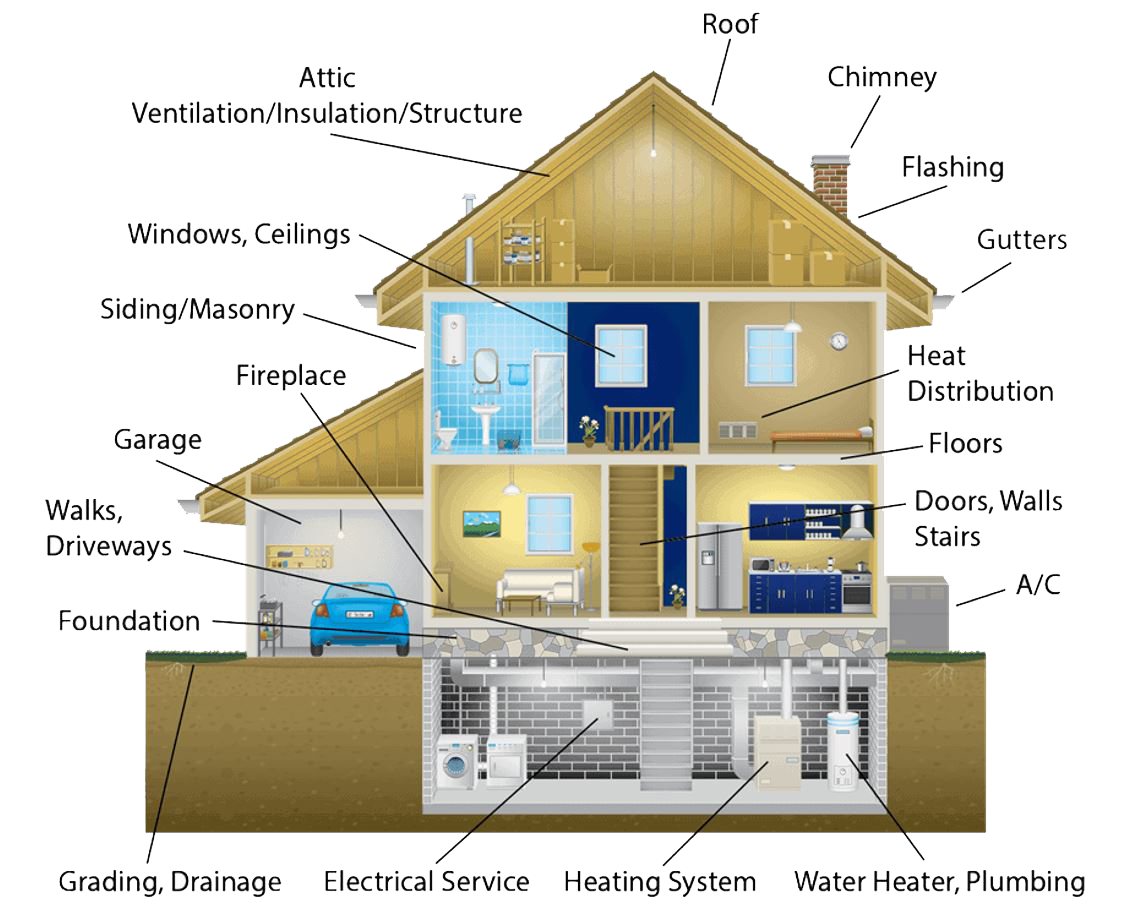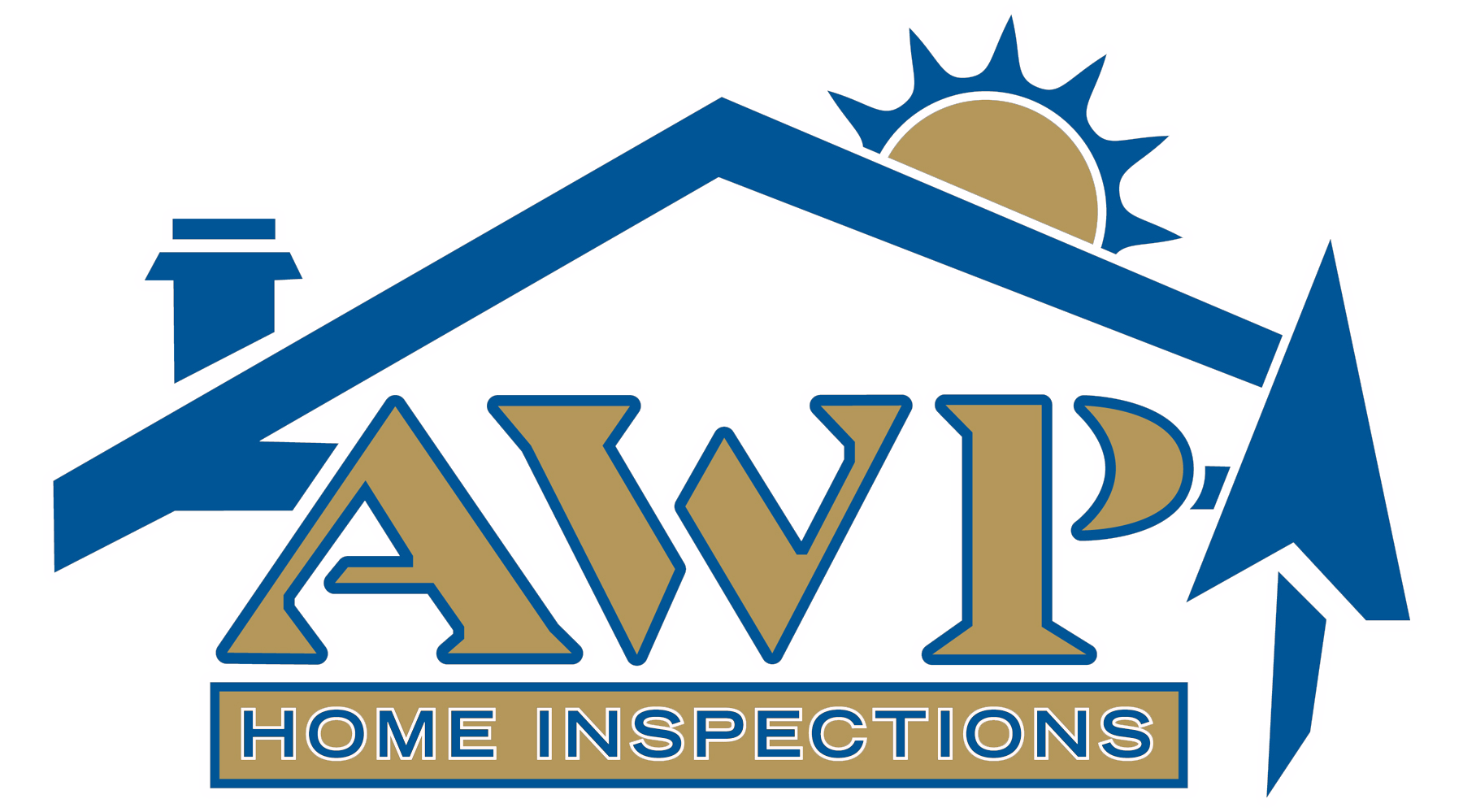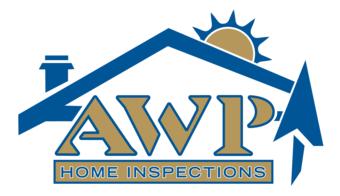WHat We Check
WHAT IS A HOME INSPECTION?
Your inspection documents on the overall condition of the home. A thorough home inspection gives the buyer details about a home’s structure, foundation, electrical, plumbing, and more. Getting a home inspection is important because it helps the buyer know if a home may need costly repairs.
What We Check on a Standard Home Inspection?
Your standard home inspection is a non-invasive, visual inspection of your structure conducted by our certified professional who will look for defects or issues with the building and its components. Our standard home inspection covers over 1,500 items and a digital report for your review is provided within 24 hours of your inspection.
Your report will include information about the condition of:
- INTERIOR, EXTERIOR, WINDOWS & DOORS
- HVAC
- BASEMENT/CRAWLSPACE
- FIREPLACE
- ROOF/ATTIC
- ELECTRICAL
- PLUMBING

Home Inspection Pricing
Our inspectors are licensed and certified through the state of Indiana. All of our home inspection reports are created using advanced technological systems and equipment and include: photographs, checklists, videos, and descriptions of components and systems. All of our reports are digitally delivered for convenience and to help do our part with saving the environment. To request a hard copy of your home inspection report, please contact us. We will assist you with your request, please be aware there will be a $15.00 fee for this service. Reports are usually uploaded and completed for viewing within 24 hours of your home inspection.
Determining a price for your home inspection involves several factors. (Our pricing starts at $275) Please call with questions.
To provide you with an accurate cost for your inspections we need information related to the property.
Questions which are helpful include
- Do you know the physical address of the house along with size of home (square feet)?
- Does the form of financing require you to have a Water Test to determine if bacteria or ecoli is present?
- Do you need a Termite Inspection (NPMA-33)? or other specific inspections?
- Do you need Environmental or Thermal Imaging services for more information?
- Does the property have its own Well? Do you need a Well Inspection?
- Does the property have its own Septic? Do you need a Septic Inspection?
- Do you need environmental services such as a Mold Inspection or Radon Inspection?
Home Inspection F.A.Q
AWP Home Inspections, LLC services West Central and Central Indiana and we are here to answer your questions about home inspections. Please click on the questions below to see answers to common questions.
What is a Complete Home Inspection?
A Complete Home Inspection is a visual, non-destructive inspection conducted by a licensed and trained home inspector. The inspector can detect issues that are not seen on a simple walk-through or visit to a property. Aspects of the property to be examined are: structural framing, electrical, plumbing, heating/air conditioning, roof, foundation, and more. The purpose of the Home Inspection is to help home buyers and sellers know the true status of the property. It is essential to know the needed repairs or damage before buying a home, so that the new homeowner does not move into a home that will require thousands of dollars of repair.
Do I Need a Home Inspection?
Yes. The purchase of a home is an important, costly, and valuable investment. In order to ensure that the buyer knows exactly what they are buying and whether the property needs any repairs, a professional home inspection should be completed before the finalized sale of the property. The results can help the buyer negotiate price and know the status of the property they are buying, so there are no unexpected “surprises” after the purchase.
How Long Does a Complete Home Inspection Take?
AWP Home Inspections takes our time to thoroughly examine the property and systems of the home during our inspections. Normally our thorough inspections average 2-4 hours. Depending on the size and physical condition of the property, the inspection may take longer.
Do I Have To Be Present for The Home Inspection?
No. Neither the home owner nor the potential buyer has to be present during the home inspection. You are welcome to stay for the inspection and ask questions about the inspection process. This could be a valuable way to learn more about your home. We also offer: We’ll Buy Your Home Back Guarantee if we miss anything to help give you peace of mind we will do our absolute best.
What is Included in a Complete Home Inspection?
The Complete Home Inspection covers all of the major structural elements and systems of the property. This includes: the roof, HVAC, plumbing, electrical, foundation, walls/doors/windows, flooring, garages, attics, decks, and more.
The Home is Newly Constructed, Do I Still Need an Inspection?
Yes! Just because a home is “new” does not mean that it was built correctly. You should always have a home inspection before purchasing a new or older home. If the problem is found in the new home, it may be easier to correct if it is detected sooner rather than later. 11th Month Warranty Inspections are extremely valuable for newly constructed homes too.
Can I Do the Home Inspection Myself?
It is not practical that you perform the home inspection yourself. Home inspectors are licensed, experienced, and certified to assess all of the systems in a home. Home Inspectors are objective in their assessments and report the facts of the home’s status. A professional Home Inspection report may be required by insurance companies and can help negotiate a final sale of the property.
What Do I Do With The Results of The Home Inspection?
After you receive the professional report detailing the results of the home inspection, you will be aware of any needed repairs or current damage that exists on the property. We can send the reports via email to your real estate agent and other interested parties as requested by you. You can use this information to negotiate a sale, repair the needed problems, or decide that the property is not a purchase you want to make. You have the knowledge and the power to make the best decision for you.
Do You Repair Any Problems You Find?
No. As a licensed certified inspector, AWP Home Inspections is prohibited by the Code of Ethics from performing any repairs on properties we inspect. This prevents any conflict of interest between the inspection and repairs needed. You can be assured that your inspection will provide an unbiased, objective result that is not influenced by the possibility of selling repair services to the homes we inspect.
Contact Us or Schedule Online
[ezcol_1third]
CALL US
[/ezcol_1third] [ezcol_1third] [ezcol_1third_end]
SCHEDULE
[/ezcol_1third_end]
DOORS, WINDOWS & INTERIOR
The inspector shall inspect:
a representative number of doors and windows by opening and closing them;
floors, walls, and ceilings;
stairs, steps, landings, stairways, and ramps;
railings, guards and handrails; and
garage vehicle doors and the operation of garage vehicle door openers, using normal operating controls.
The inspector shall describe:
a garage vehicle door as manually-operated or installed with a garage door opener.
The inspector shall report as in need of correction:
improper spacing between intermediate balusters, spindles, and rails for steps, stairways, guards, and railings;
photo-electric safety sensors that did not operate properly; and
any window that was obviously fogged or displayed other evidence of broken seals.
The inspector is not required to:
inspect paint, wallpaper, window treatments or finish treatments.
inspect floor coverings or carpeting.
inspect central vacuum systems.
inspect for safety glazing.
inspect security systems or components.
evaluate the fastening of islands, countertops, cabinets, sink tops, or fixtures.
move furniture, stored items, or any coverings, such as carpets or rugs, in order to inspect the concealed floor structure.
move suspended-ceiling tiles.
inspect or move any household appliances.
inspect or operate equipment housed in the garage, except as otherwise noted.
verify or certify the proper operation of any pressure-activated auto-reverse or related safety feature of a garage door.
operate or evaluate any security bar release and opening mechanisms, whether interior or exterior, including their
compliance with local, state, or federal standards.
operate any system, appliance, or component that requires the use of special keys, codes, combinations, or devices.
operate or evaluate self-cleaning oven cycles, tilt guards/latches, or signal lights.
inspect microwave ovens or test leakage from microwave ovens.
operate or examine any sauna, steam-generating equipment, kiln, toaster, ice maker, coffee maker, can opener, bread warmer,
blender, instant hot-water dispenser, or other small, ancillary appliances or devices.
inspect elevators.
inspect remote controls.
inspect appliances.
inspect items not permanently installed.
discover firewall compromises.
inspect pools, spas or fountains.
determine the adequacy of whirlpool or spa jets, water force, or bubble effects.
determine the structural integrity or leakage of pools or spas.
EXTERIOR
The inspector shall inspect:
the exterior wall-covering materials;
the eaves, soffits, and fascia;
a representative number of windows;
all exterior doors;
flashing and trim;
adjacent walkways and driveways;
stairs, steps, stoops, stairways and ramps;
porches, patios, decks, balconies, and carports;
railings, guards and handrails; and
vegetation, surface drainage, retaining walls, and grading of the property, where they may adversely affect the structure due
to moisture intrusion.
The inspector shall describe:
the type of exterior wall-covering materials.
The inspector shall report as in need of correction:
any improper spacing between intermediate balusters, spindles and rails.
The inspector is not required to:
inspect or operate screens, storm windows, shutters, awnings, fences, outbuildings, or exterior accent lighting.
inspect items that are not visible or readily accessible from the ground, including window and door flashing.
inspect or identify geological, geotechnical, hydrological or soil conditions.
inspect recreational facilities or playground equipment.
inspect seawalls, break walls or docks.
inspect erosion-control or earth-stabilization measures.
inspect for safety-type glass.
inspect underground utilities.
inspect underground items.
inspect wells or springs.
inspect solar, wind or geothermal systems.
inspect swimming pools or spas.
inspect wastewater treatment systems, septic systems or cesspools.
inspect irrigation or sprinkler systems.
inspect drain fields or dry wells.
determine the integrity of multiple-pane window glazing or thermal window seals.
HEATING
The inspector shall inspect:
the heating system, using normal operating controls.
The inspector shall describe:
the location of the thermostat for the heating system;
the energy source; and
the heating method.
The inspector shall report as in need of correction:
any heating system that did not operate; and
if the heating system was deemed inaccessible.
The inspector is not required to:
inspect, measure, or evaluate the interior of flues or chimneys, fire chambers, heat exchangers, combustion air
systems, fresh-air intakes, makeup air, humidifiers, dehumidifiers, electronic air filters, geothermal systems, or solar heating systems.
inspect fuel tanks or underground or concealed fuel supply systems.
determine the uniformity, temperature, flow, balance, distribution, size, capacity, BTU, or supply adequacy of the heating system.
light or ignite pilot flames.
activate heating, heat pump systems, or other heating systems when ambient temperatures or other circumstances are not conducive to safe operation or may damage the equipment.
override electronic thermostats.
evaluate fuel quality.
verify thermostat calibration, heat anticipation, or automatic setbacks, timers, programs or clocks.
measure or calculate the air for combustion, ventilation, or dilution of flue gases for appliances.
COOLING
The inspector shall inspect:
the cooling system, using normal operating controls.
The inspector shall describe:
the location of the thermostat for the cooling system; and
the cooling method.
The inspector shall report as in need of correction:
any cooling system that did not operate; and
if the cooling system was deemed inaccessible.
The inspector is not required to:
determine the uniformity, temperature, flow, balance, distribution, size, capacity, BTU, or supply adequacy of the cooling system.
inspect portable window units, through-wall units, or electronic air filters.
operate equipment or systems if the exterior temperature is below 65° Fahrenheit, or when other circumstances are not conducive to safe operation or may damage the equipment.
inspect or determine thermostat calibration, cooling anticipation, or automatic setbacks or clocks.
examine electrical current, coolant fluids or gases, or coolant leakage.
BASEMENT, FOUNDATION, CRAWLSPACE & STRUCTURE
The inspector shall inspect:
the foundation;
the basement;
the crawlspace; and
structural components.
The inspector shall describe:
the type of foundation; and
the location of the access to the under-floor space.
The inspector shall report as in need of correction:
observed indications of wood in contact with or near soil;
observed indications of active water penetration;
observed indications of possible foundation movement, such as sheetrock cracks, brick cracks, out-of-square door frames, and unlevel floors; and
any observed cutting, notching and boring of framing members that may, in the inspector’s opinion, present a structural or safety concern.
The inspector is not required to:
enter any crawlspace that is not readily accessible, or where entry could cause damage or pose a hazard to him/herself.
move stored items or debris.
operate sump pumps with inaccessible floats.
identify the size, spacing, span or location or determine the adequacy of foundation bolting, bracing, joists, joist spans or support systems.
provide any engineering or architectural service.
report on the adequacy of any structural system or component.
FIREPLACE
The inspector shall inspect:
readily accessible and visible portions of the fireplaces and chimneys;
lintels above the fireplace openings;
damper doors by opening and closing them, if readily accessible and manually operable; and
clean out doors and frames.
The inspector shall describe:
the type of fireplace.
The inspector shall report as in need of correction:
evidence of joint separation, damage or deterioration of the hearth, hearth extension or chambers;
manually operated dampers that did not open and close;
the lack of a smoke detector in the same room as the fireplace;
the lack of a carbon-monoxide detector in the same room as the fireplace; and
cleanouts not made of metal, pre-cast cement, or other non-combustible material.
The inspector is not required to:
inspect the flue or vent system.
inspect the interior of chimneys or flues, fire doors or screens, seals or gaskets, or mantels.
determine the need for a chimney sweep.
operate gas fireplace inserts.
light pilot flames.
determine the appropriateness of any installation.
inspect automatic fuel-fed devices.
inspect combustion and/or make-up air devices.
inspect heat-distribution assists, whether gravity-controlled or fan-assisted.
ignite or extinguish fires.
determine the adequacy of drafts or draft characteristics.
move fireplace inserts, stoves or firebox contents.
perform a smoke test.
dismantle or remove any component.
perform a National Fire Protection Association (NFPA)-style inspection.
perform a Phase I home inspection for the fireplace and chimney.

Your Top Choice for Inspection Services™
CONTACT US TODAY!
[ezcol_1third]
CALL US
[/ezcol_1third] [ezcol_1third_end]
SCHEDULE INSPECTION
[/ezcol_1third_end]
ACCESS INSPECTION REPORT
Having trouble?
WHY CHOOSE US
Your Top Choice for Inspection Services in West Central and Central Indiana (TM)
Indianapolis, West Lafayette, Lafayette, Frankfort, Crawfordsville, Brownsburg, Avon, Plainfield, Zionsville, and Greencastle
